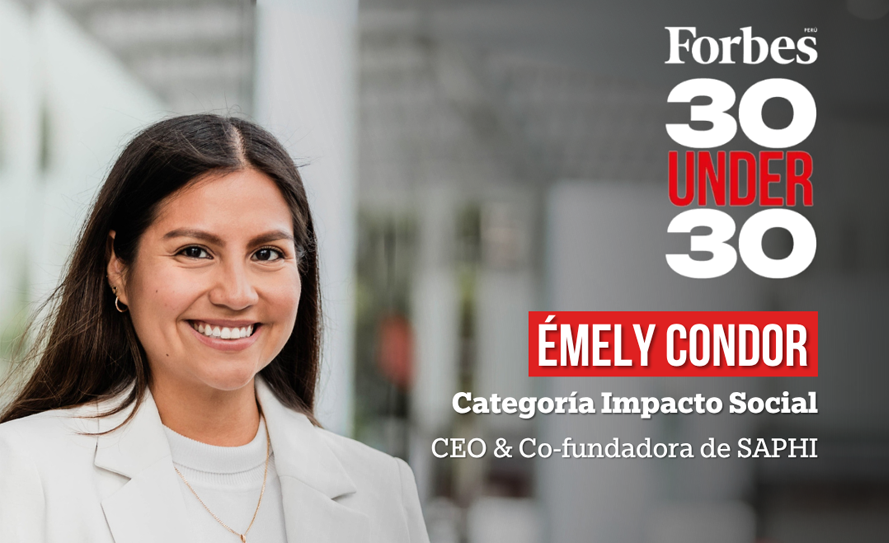Emely Cóndor, an economics graduate from the Universidad del Pacífico, has been included in the prestigious Forbes Perú 30 Under 30 list in recognition of the work of her social enterprise, Saphi, which aims to revitalize native languages through the use of artificial intelligence. In a country where more than four million people are excluded due to language barriers, Emely's proposal shows that the economy can also be a tool for cultural, social, and technological transformation.
A childhood that instilled purpose
SAPHI's story begins with a personal experience that marked Emely Condor's childhood. During a trip to Cusco with her mother, Emely heard Quechua spoken—by a group of women—for the first time. Emely's inability to understand the women prompted her to question why there were such deep divisions among Peruvians. Over time, the childhood memory was transformed into a clear purpose: to break down the linguistic barriers that, historically, have marginalized millions in Peru. "I founded SAPHI so that speaking an indigenous language is no longer a reason for exclusion," says the UP graduate.
Yet Saphi's purpose goes beyond communicative inclusion; it seeks to vitalize Peru's indigenous languages from the roots up, recognizing them as living expressions of culture, history, and identity. As Emely puts it, "we want to make speaking Quechua, Aymara, Yine, Matsigenka and other languages a source of pride, not shame."
Qimiy: Technology with identity to break down barriers
In line with this vision, Saphi developed Qimiy, the first AI-based Quechua chatbot designed to facilitate access to financial services for Quechua speakers. The initiative emerged from a fundamental question: How can one access key services if the language is not understood?
Qimiy therefore answers basic user questions in Quechua, both orally and in writing. The service has been trailed by more than 60 Quechua speakers in Lima and Ayacucho, and has collected 300 real questions that have served to train and improve its performance. SAPHI is currently seeking partnerships with financial institutions to implement pilots in areas with high Quechua-speaking populations. "The biggest challenge was that there was no previous data in Quechua to train AI. We had to create it from scratch, working with native speakers and linguists," explained the social entrepreneur.
To compound this challenge, the technology had to be adapted to rural contexts with limited connectivity. However, Saphi's conviction is firm: Technology should be a bridge to inclusion, not a privilege. Says Emely: “When technology speaks the language of the community, it creates real access." For her, artificial intelligence must do more than automating processes—it must also contribute to repairing historical inequalities.

Training with social impact and commitment
During her studies at the Universidad del Pacífico, Emely Cóndor understood that economics could go beyond numbers. Her academic training furnished her with the technical instruments to analyze economic development and, at the same time, to observe social inequalities through a critical lens. "The UP gave me the tools to understand economic development, but it also showed me that it must serve to generate social impact," she noted.
Saphi took shape thanks to the support of Emprende UP, the university's business incubator, which accompanied the social enterprise from its early stages. "It was one of the first spaces that believed in Saphi when it was just an idea," recalls Emely. The support Emely received in mentoring, validation, and development of the MVP was key to transforming a vision into a sustainable business model.
Given her training as an economist, strategic planning and a systemic vision of development stand out to Emely as essential tools for building a robust value proposition. "SAPHI is not just a cultural enterprise; it is a company that generates value," adds Emely.
Her recognition in the Forbes Perú 30 Under 30 marks not only a personal achievement but a collective one as well. "Representing the UP and the economics degree program in Forbes 30 Under 30 shows that economists can also lead social and cultural projects," she concludes. Emely Cóndor's inclusion in these prestigious rankings attests to her place among a new generation of professionals committed to social transformation.
Inspiring through identity and innovation
Emely Condor's story proves that business can also have soul, identity, and purpose. Through Saphi she has integrated technology and cultural identity to show that inclusion, more than an ideal, is a possible practice when founded on empathy, strategy, and innovation.
We at the Universidad del Pacífico and the Faculty of Economics and Finance congratulate Emely Cóndor for this major recognition and for boldly leading an enterprise that, through technology and cultural identity, is helping to build a more inclusive country. Her story inspires our entire community and reaffirms the power of education to transform realities.